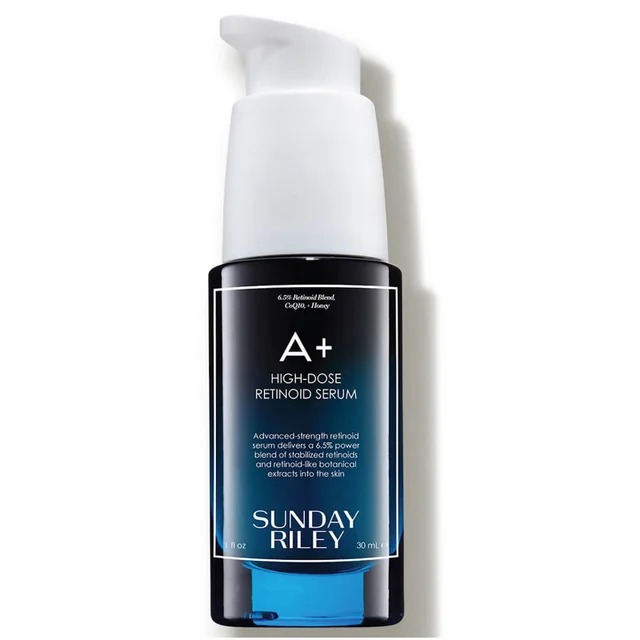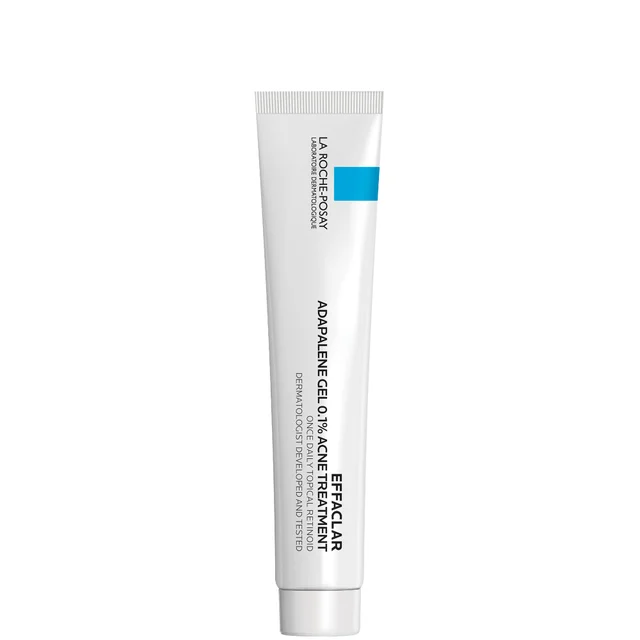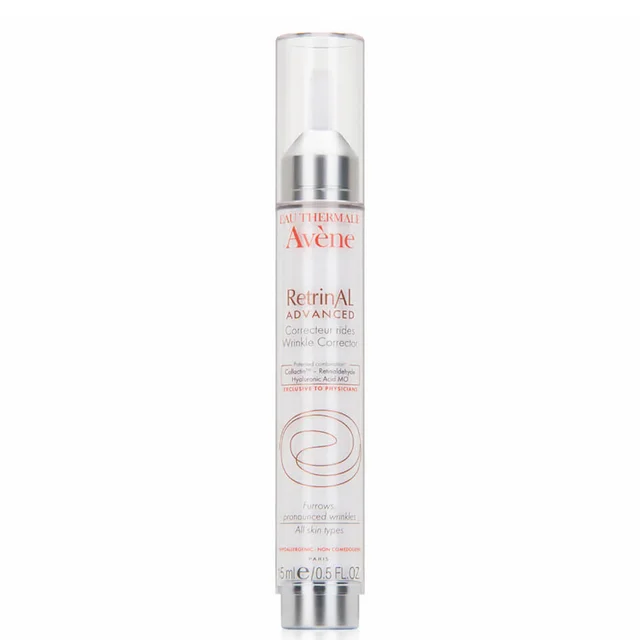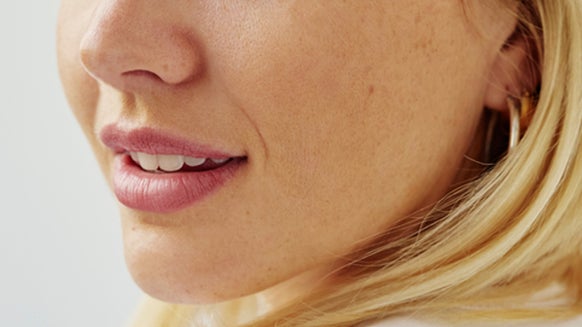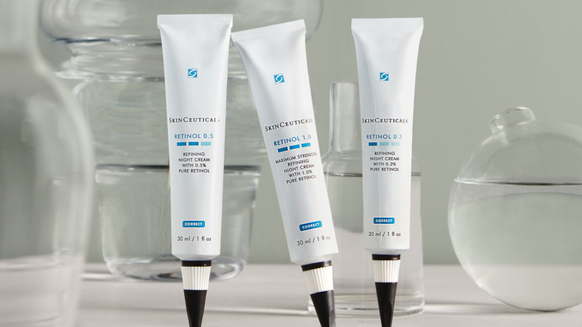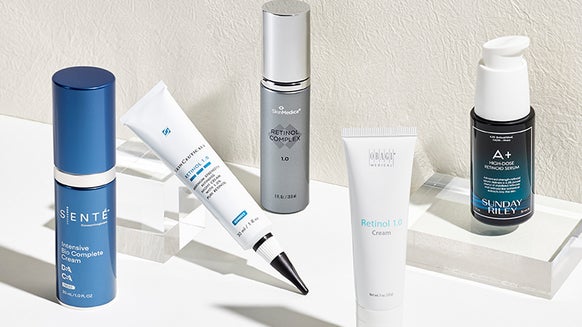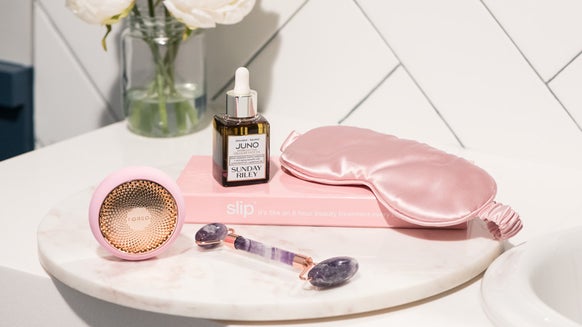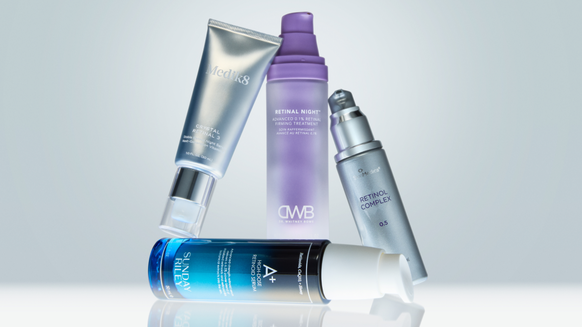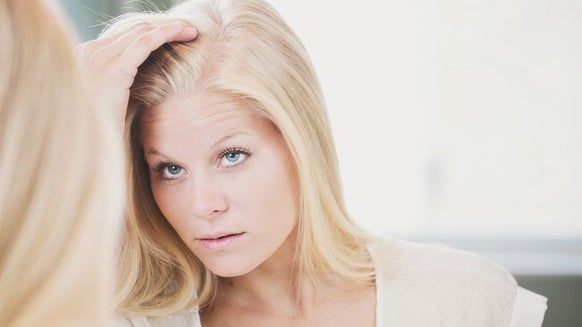The Different Types of Retinoids and How They Benefit Your Skin
Retinoids are hands-down the gold standard when it comes to anti-aging skin care, and for good reason. “Retinoids are vitamin A derivatives that work by binding to retinoic acid receptors, which then can act as transcription factors and affect gene expression. This makes them very powerful and able to produce significant changes in the skin,” explains New York City board-certified dermatologist Hadley King, MD. “They increase the turnover of skin cells, reduce the tendency of cells and keratin debris to clump together and clog up pores, increase collagen production and decrease discoloration.”
Given the long list of benefits, it’s not surprising to find one of vitamin A’s many forms as the star ingredient in so many skin care products on the market today. A wide range of ingredients—retinol, retinoic acid, adapalene, tretinoin and more—fall under the retinoid umbrella, but work in slightly different ways. While most people may already have a general idea of what retinoids are used for, knowing which type will work best for your skin concerns may require a little digging.
Prescription vs. Over-the-Counter Retinoids
Depending on your skin type and concerns, your dermatologist may recommend an over-the-counter retinol cream or prescribe a more potent prescription treatment. “Topical retinoids are prescribed more often for acne. Topical retinoids are helpful for acne because they have a comedolytic effect, meaning that they help to prevent and treat clogged pores,” says Dr. King. “They also decrease the discoloration that can be left after a pimple, and because they increase the turnover of skin cells, this reduces the healing time for acne.”
On the other hand, board-certified dermatologist Debra Jaliman, MD, assistant professor of dermatology at Icahn School of Medicine at Mount Sinai, says over-the-counter versions like retinol “contain lower concentrations of the retinoid,” which may not give you the same effect as prescription ones. That said, Dr. King explains, “The potency will also depend very much on the percentage of the ingredient.”
Because of their typically gentler formulations, non-prescription retinoids are generally deemed safer for sensitive skin. Particularly, newer variations of the ingredient have been proven to have high efficacy with lower risks of irritation that make them ideal for sensitive skin types, Dr. King adds.
Additionally, oral retinoids can also be prescribed to treat more serious conditions ranging from severe acne and psoriasis to cutaneous T-cell lymphoma and Kaposi’s sarcoma.
Things to Remember When Using Retinoids
While retinoids are hailed for their proven benefits and noticeable results, they also come with certain side effects that may raise some alarms for first-time users. “Retinoid products can initially be irritating and/or drying to the skin. As such, it is prudent to start using them once or twice per week and slowly increasing to nightly as tolerated. Using a small pea-sized amount of product can be helpful,” explains board-certified dermatologist Natalie Yin, MD, assistant professor of dermatology at Columbia University Medical Center. “Waiting until the skin is completely dry before applying the medication and folding in a moisturizer afterwards can also help minimize irritation.”
Sunlight also affects the stability of retinoids, which means it’s best to use them at night. But for those whose daytime products include retinoid ingredients like retinol, Dr. Jaliman says, “Use caution when spending time out in the sun. Using retinol can make your skin more sun-sensitive, so always use a broad-spectrum sunscreen above SPF 30.” Pregnant women are also advised against using products with retinoid ingredients. “High doses of vitamin A during pregnancy can be harmful to an unborn child and can cause birth defects,” warns Dr. Jaliman.
Types of Retinoid Ingredients
To get you started on choosing the right retinoid ingredient to add to your skin care routine, we talked to top dermatologists and put together a guide to the most common retinoid forms and how they can benefit your skin.
• Retinoid: Retinoid is the umbrella term for the class of molecules that bind to retinoic acid receptors, says Dr. King. It is also used casually to refer to prescription-strength versions of the ingredient.
• Retinoic Acid: According to Dr. Jaliman, retinoic acid is the active form that vitamin A breaks down into in order to be utilized by the skin. It plays a role in cell growth, stimulates collagen and elastin production and improves hyperpigmentation and discoloration. Prescription retinoids contain retinoic acid, while over-the-counter retinoids are gradually converted to retinoic acid through a reaction that occurs within the skin.
• Retinol: Over the years, retinol has become one of the most sought-after ingredients in anti-aging skin care products, thanks to its unmatched efficiency in addressing the most common signs of aging. Although less potent than prescription retinoids, retinol is known to accelerate cell turnover, boost collagen production and smooth and even out skin tone.
Try:Sunday Riley A+ High-Dose Retinoid Serum
When it comes to keeping your skin looking younger and more radiant, this powerful serum definitely doesn’t hold back. Its potent 6.5 percent solution is a combination of powerful retinol blends and plant-based retinol alternatives, targeting the most common signs of aging (fine lines and wrinkles, uneven skin tone and dark spots), breakouts and sun-damaged skin. In a clinical study, up to 96 percent of respondents reported that this serum has effectively treated their skin concerns.
• Tretinoin (also known as Retin-A, Renova): “This is a prescription topical retinoid. In its mildest forms, it’s used for its anti-aging properties. In stronger forms, it is used for acne,” explains Dr. King.
• Tazarotene (Tazorac): Considered one of the most potent topical retinoids, tazarotene in lower percentages is generally used to treat acne while stronger dosages are prescribed for psoriasis, says Dr. King.
• Isotretinoin (aka Accutane): This prescription oral vitamin A derivative is more potent than topical varieties because of its ingested form, says Dr. Yin. “Accutane is used for more aggressive, cystic or scarring acne.”
• Adapalene: Adapalene 0.1% gel is a recently approved over-the-counter retinoid that is “best for sensitive skin because it has a decreased risk of irritation compared to other prescription retinoids and excellent efficacy for treating acne,” says Dr. King. It is also known for its anti-inflammatory effect and low absorption rate through human skin. “It is the first in the class of drugs known as retinoids to be made available over-the-counter for the treatment of acne,” she adds.
Try:La Roche-Posay Effaclar Adapalene Gel 0.1% Retinoid Acne Treatment
This oil-free, fragrance-free formula helps clear up blemishes, whiteheads, blackheads and clogged pores with its prescription-strength active ingredient.
• Retinal/Retinaldehyde: One of the newest varieties of retinoid ingredients, retinal or retinaldehyde has become the latest skin care MVP because of its ability to deliver the same anti-aging benefits as retinol but in a faster (up to 11 times) and more efficient way. This non-prescription retinoid “has been shown to be less irritating in small studies and may be better tolerated [by the skin],” adds Dr. Yin.
Try:Avène RetrinAL ADVANCED Wrinkle Corrector
This targeted gel concentrate works its anti-aging magic by combining three powerful ingredients—retinaldehyde, hyaluronic acid and thermal spring water—to hydrate and plump up the skin, fill deep lines and creases and smooth and brighten texture. The result? Visibly radiant, firmer and younger-looking skin.
• Plant-Based Retinol Alternatives: “Some plant-based ‘retinols’ imitate retinol to a degree because of its anti-aging properties,” says Dr. Jaliman. Bakuchiol, an extract of the babchi plant, is “one of the few retinol alternatives for which studies back up the pseudo-retinol effect of anti-aging and skin-brightening,” adds Dr. King. Studies have also found bakuchiol to be less irritating than traditional retinoids.
Try: Herbivore Botanicals Bakuchiol Retinol Alternative Serum
This unique jelly-like serum uses plant-derived bakuchiol to work below skin’s surface to target fine lines. Ultra-gentle polyhydroxy acids exfoliate on the surface level to leave skin smooth.

Janeca Racho is a Journalism graduate with over 15 years of writing experience. After getting her start in public relations and advertising, she made the switch to freelance writing and began working for various lifestyle, fashion, and travel brands. Her love for all things skincare has led her to beauty reporting and research for the last ten years. Writing for several hair and beauty blogs, she reports on anti-aging staples, trending brands and products, must-have ingredients, and health and wellness.
